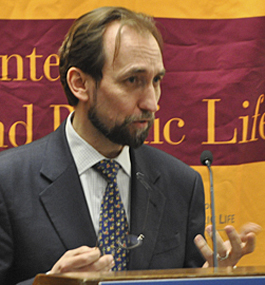In Nuremberg's Shadow

Ariana Hajmiragha
Prince Zeid Ra'ad Zeid Al-Hussein
by Daniel Terris
He began by describing his recent, emotional visit to the zeppelin field in Nuremberg, Germany, where the Nazi Party held massive rallies in the 1930s. He recalled his grandfather’s experience as the Nazis consolidated their power and began their systematic campaigns against the Jewish people, then he made powerful connections between the Holocaust and issues of genocide and justice in our own time.
The speaker was neither a scholar nor a lawyer; he was not a descendant of Holocaust victims. He was Prince Zeid Ra’ad Zeid Al-Hussein, a member of the Jordanian royal family and the Hashemite Kingdom’s permanent representative to the United Nations.
Zeid came to Brandeis in January to deliver the Distinguished Lecture in International Justice and Human Rights, hosted by the International Center for Ethics, Justice and Public Life. The grandfather he described was the Iraqi ambassador to Nazi Germany, a man repelled by the bigotry and cruelty he witnessed in that country.
Growing up hearing about the Holocaust and the massive tragedies that followed have impelled this Arab prince on a quest to hold contemporary leaders accountable for their crimes against undefended men, women and children around the world.
For Zeid, the lessons of the Holocaust teach us the necessity of a global structure of legal accountability for atrocity crimes. He believes that the International Criminal Court, in whose founding he played an important role, is a crucial bulwark — humankind’s best hope to end impunity, stay the hand of revenge, and honor the memory of the victims of crimes against humanity.
Formal justice is necessary but not sufficient in a world where crimes of monstrous proportion can be committed by “ordinary” people, said Zeid. “Introduce the wrong software,” he warned, “and the angel can be swept away by the devil in us.”
Institutions of higher learning have a vital role to play in both preventing atrocity crimes and holding the guilty accountable, Zeid said: “If education is devoid of a strong universal human-rights component, it can be next to worthless when it should matter most: when our world begins to unravel.”
Nuremberg, the prince reminded his Brandeis listeners, is a legacy we all share.
Daniel Terris, P’08, P’11, P’12, P’15, is the director of the International Center for Ethics, Justice and Public Life.
